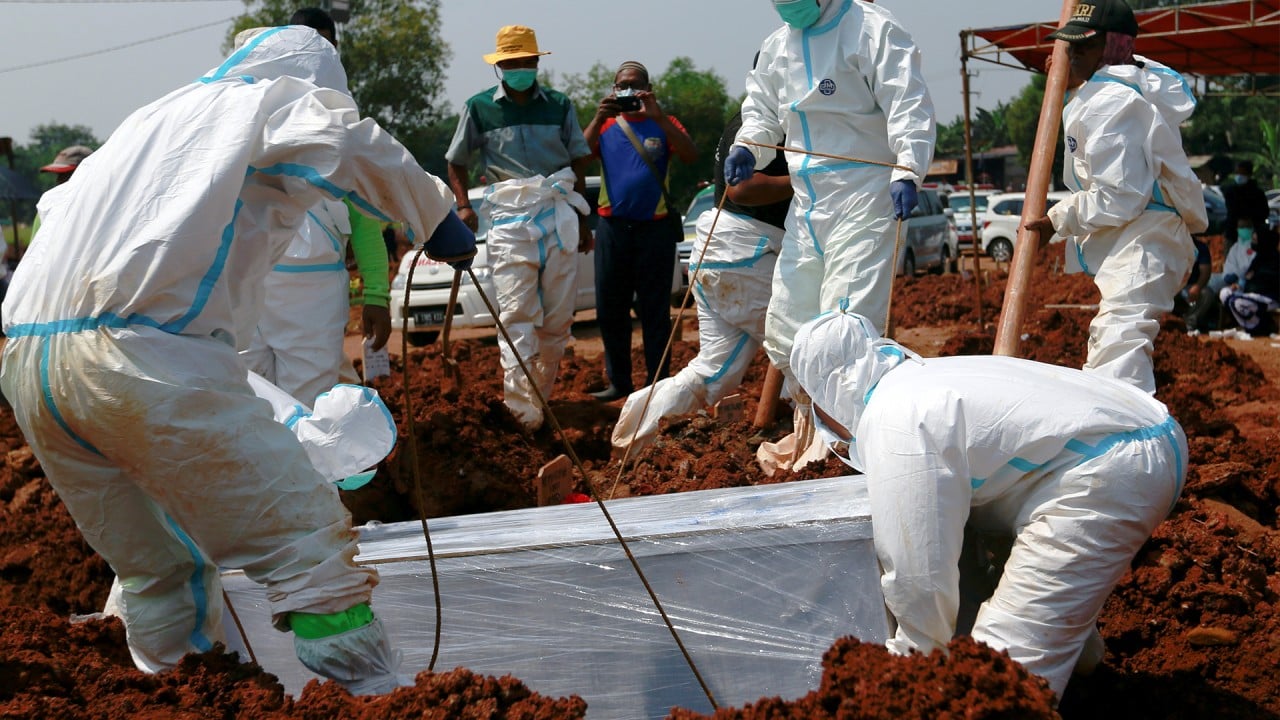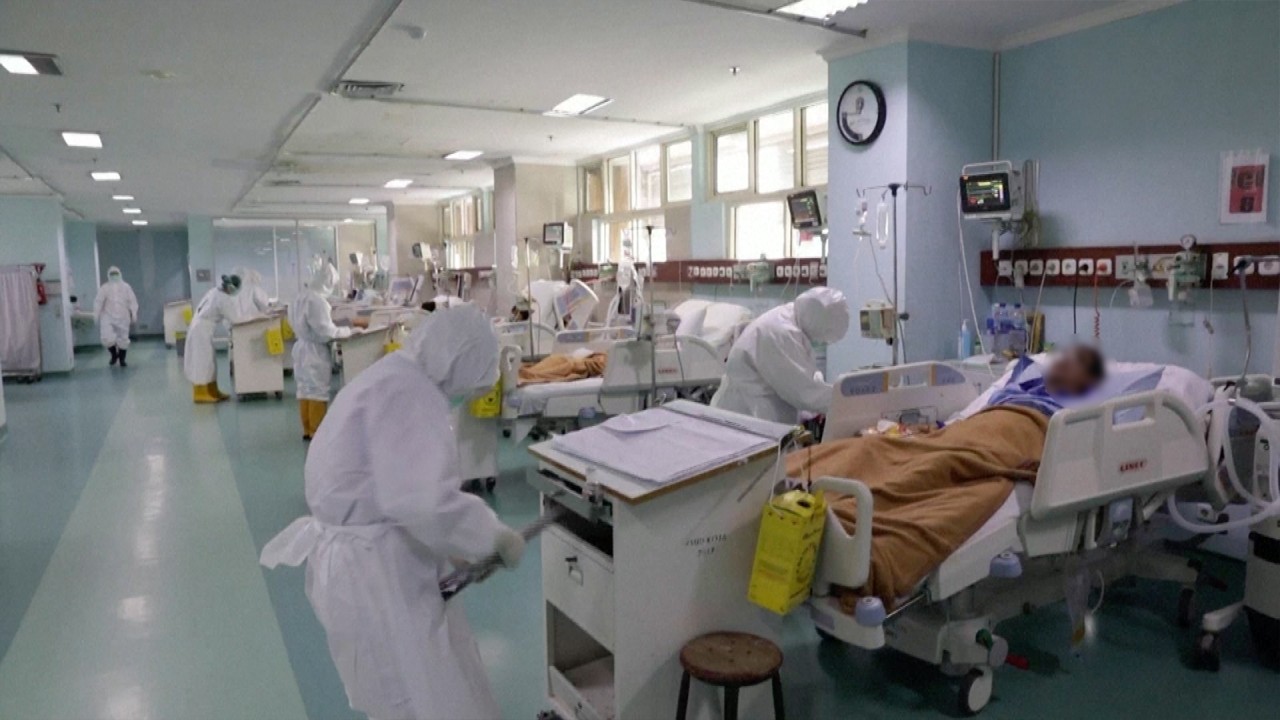
Coronavirus: vaccines ‘surest way to prevent more deaths’ as global toll hits 4 million
- WHO chief says world is at ‘perilous point’ with death toll likely to be underestimated
- Vaccination should be sped up and doses supplied to those who need them, according to health experts
“One friend was buried last Friday. This has left me very scared as the deaths came too near. We were very close friends,” Nanjala said. “I feel very sad as my friends were young and left behind children.”

03:51
Global Covid-19 death toll hits 4 million as WHO says vaccines ‘surest way to prevent more deaths’
“The world is at a perilous point in this pandemic. We have just passed the tragic milestone of 4 million recorded Covid-19 deaths, which likely underestimates the overall toll,” said Tedros Adhanom Ghebreyesus, WHO director general, in a news briefing on Wednesday.
Eighteen months after Covid-19 and the virus that causes it were first identified in Wuhan, China, the situation globally remains fragile. More than 184.3 million people had been infected as of Wednesday, with an average of over 370,000 cases reported daily in the previous week.
Some countries, including Britain and Indonesia, are seeing a sharp rise in cases and hospital admissions, partly because more infectious strains of the virus are circulating.

04:17
Indonesia grapples with one of Asia’s worst Covid-19 outbreaks
But vaccines appear to be slowing the death rate, at least for now – WHO data suggests the weekly toll has been falling since April, even as cases continue to rise – and experts say vaccination is the key to avoiding more deaths.
“The surest way to prevent more Covid-19 deaths is to increase vaccination uptake,” said Eric Finkelstein, a professor with the Lien Centre for Palliative Care at the Duke-NUS Medical School.
That view was echoed by Robert Booy, a professor of infectious diseases with the University of Sydney.
“It’s very clear that vaccination is having a big impact,” he said. “Getting from 3.9 million to 4 million has taken longer than we expected.”
He said in countries with access to vaccines, vulnerable people – especially the elderly – had been inoculated, contributing to the fact that more cases had not led to proportionally more deaths.
Booy also noted that the Delta variant was “more transmissible, but possibly less severe”.
In Britain – where 64 per cent of adults had been fully vaccinated as of Wednesday and Covid-19 restrictions are to be eased later this month – infections are surging among the young and unvaccinated, driven almost entirely by the Delta variant. More than 192,000 cases have been reported in the past seven days, an increase of 42 per cent from the previous week, with 161 deaths, up 42 per cent.
In African countries, just four vaccine doses have been administered for every 100 people – compared to a global average of 40 doses per 100 – and across the continent, the death toll jumped by 23 per cent in the week to Sunday from the previous seven days.
John Stremlau, a professor of international relations at the University of the Witwatersrand in South Africa, said the country was being ravaged by the Delta variant. “I know way too many good people who have died, too many to mention,” he said.
African countries had reported a total of more than 5.7 million infections and over 148,000 deaths as of Wednesday, according to data published by the Worldometer website.
Gregory Gray, an infectious disease epidemiologist with Duke University’s School of Medicine, said developing countries were being hit hard. “It’s obvious the developing countries are suffering now. They’re going to probably suffer the most and the longest,” he said.
Booy from the University of Sydney said action was needed to improve vaccine distribution.
“The world, Europe, China, North America, has to act now to provide vaccine supply to the people who need it. The Covax Facility is endeavouring to supply 20 per cent of people in poor countries, for example, in Africa, but that’s not good enough,” he said. “We need to get 50 per cent of people and more vaccinated. Whether it’s China, North America or Europe, we should be giving more.”

07:07
The global spread of the highly contagious Delta variant of Covid-19
Meanwhile, with the next pandemic in mind, infectious disease experts like Gray from Duke University say it is also crucial to keep track of “human-animal interface viruses” that are beginning to adapt to humans before they become transmissible, or highly transmissible, to people.
“In the best of situations, we can ramp up vaccine production faster than ever before like we have, but still there are 4 million people who have died,” Gray said. “We need to be thinking about what we can do differently to prevent such extreme morbidity and mortality – we can’t just do it by waiting for something to happen and then develop a vaccine.”
He said the transition from an animal virus to a human pathogen took years and involved a series of spillover events before it became highly transmissible. That gave scientists time to step up surveillance of people working with animals, including the wildlife trade, for signs of novel respiratory viruses, and when new pathogens were discovered they should be quickly assessed for their risk to humans and a mitigation strategy, according to Gray.
“It can take up to 20 years for that virus to become efficient, but if we can identify a virus that is beginning to adapt, we can develop vaccines and try to catch it early to reduce the transmission early instead of waiting until it becomes widespread and transmissible,” he said.
Additional reporting by Jevans Nyabiage

